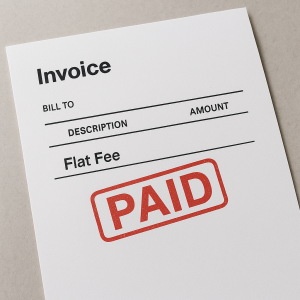For decades, the billable hour has been the foundation of legal billing models, especially in litigation and complex cases. But as AI and automation streamline work and client expectations evolve, firms are exploring billable hour alternatives like flat fees and hybrid billing models. It’s time to rethink billing and consider more modern, efficient, and client-friendly ways to price legal services.
The Traditional Case for Time & Expense
Time and expense billing, built around the billable hour, emerged to align effort with compensation. Lawyers handling unpredictable caseloads were paid for each hour of intellectual work, which made sense when outcomes and timelines were uncertain. This approach helped protect both law firms and clients from financial imbalance, making it a foundational legal billing model for decades.
Why Legal Marketing Firms Are Shifting Their Billing Models

Today’s clients aren’t just asking for results. They want predictability, transparency, and value. At the same time, legal technology, especially AI and AI agents, has dramatically reduced the time required for many tasks. A legal research memo that once took three hours can now be completed in just 30 minutes with the right tools. For legal marketing firms, this raises an important question: if the output and value remain the same, should the cost still follow the traditional billable hour model? Many firms are now exploring billable hour alternatives models to better align pricing with client expectations.
What Parts of a Matter Can Be Flat-Fee?
Rather than tossing out time and expense billing altogether, firms should conduct a billing audit: Which parts of a matter are still being billed by habit, not necessity?
Here are areas ripe for rethinking:
- Legal Research: With AI tools providing draft answers in minutes (subject to attorney verification), many firms are moving to flat fees for research tasks.
- Court Appearances: Instead of clocking hours in and out, consider a flat daily rate for trial or hearing days.
- Discovery and Document Review: Thanks to automation and predictive coding, these phases can be scoped and priced in advance more easily.
Hybrid Billing: The Best of Both Worlds
 The future of legal pricing may not be a binary choice between hourly and flat-fee. A hybrid model allows firms to align pricing with the value, risk, and predictability of each task:
The future of legal pricing may not be a binary choice between hourly and flat-fee. A hybrid model allows firms to align pricing with the value, risk, and predictability of each task:
- Hourly for bespoke strategy and complex judgment calls
- Flat-fee for repeatable, tech-enhanced tasks
- Milestone pricing for defined matter phases
A Call for Strategic Pricing
Lawyers pride themselves on their analytical minds. So apply that same analysis to your billing model. Are you pricing based on effort, or value? Are you rewarding efficiency, or penalizing it?
Clients are evolving. Tools are advancing. And law firms that thoughtfully adapt their billing models will not only compete better—they’ll build deeper trust with their clients.
The billable hour may never fully disappear. But it shouldn’t be the only lens through which we see the value of legal work. Sometimes, it’s not about working longer—it’s about working smarter, and pricing smarter too.
Where Practice Management Comes In
 Adopting hybrid or alternative billing models isn’t just a philosophical shift—it requires practical support. Many modern practice management systems are designed to accommodate both flat and time-and-expense billing with ease. At 2b1 Inc., we help firms evaluate and implement these tools effectively. Whether you’re choosing a new platform or customizing the one you already use, we can help ensure your systems support the billing strategy that fits your practice best—so you can focus on delivering value, not chasing hours.
Adopting hybrid or alternative billing models isn’t just a philosophical shift—it requires practical support. Many modern practice management systems are designed to accommodate both flat and time-and-expense billing with ease. At 2b1 Inc., we help firms evaluate and implement these tools effectively. Whether you’re choosing a new platform or customizing the one you already use, we can help ensure your systems support the billing strategy that fits your practice best—so you can focus on delivering value, not chasing hours.

